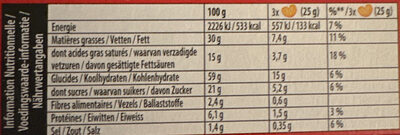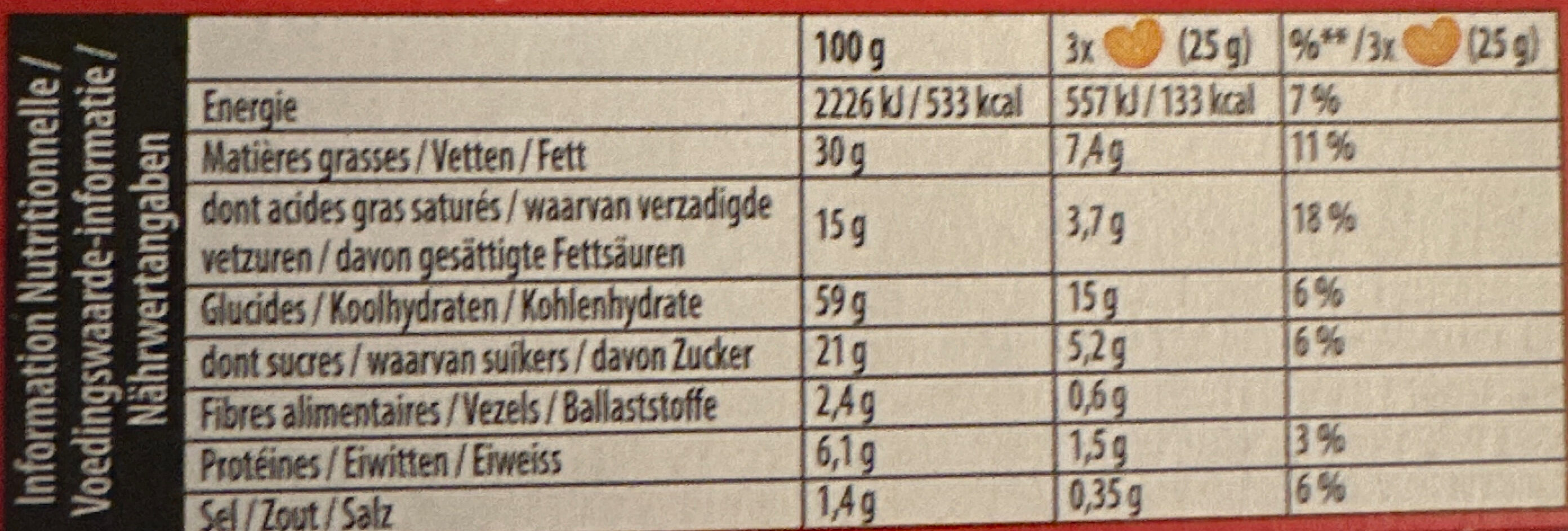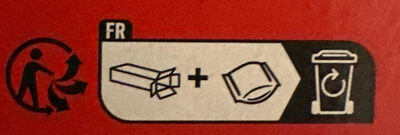Palmito L'original - Lu - 100 g, 2 sachets
Barcode: 3017760030106 (EAN / EAN-13)
Common name: Biscuits feuilletés
Quantity: 100 g, 2 sachets
Packaging: Box, Cardboard, fr:Boite à recycler, fr:Point vert, fr:Sachet à jeter
Categories: Snacks, Sweet snacks, Biscuits and cakes, Biscuits, Shortbread cookies, Flaky biscuits, Palmiers
Labels, certifications, awards:
Green Dot, Triman

Origin of ingredients: France, Belgium
Link to the product page on the official site of the producer: http://www.lu.fr/biscuits-traditionnels/...
Stores: Super U, Cora, Magasins U, carrefour.fr
Countries where sold: Belgium, France, Guadeloupe, Luxembourg, New Caledonia, Réunion
Matching with your preferences
Report a problem
Data sources
Product added on by teolemon
Last edit of product page on by soulreaper.
Product page also edited by aleene, annelotte, cmfg, date-limite-app, delicesnovice, driveoff, ecoscore-impact-estimator, fafa25, foodvisor, g123k, inf, kiliweb, magasins-u, naruyoko, off, openfoodfacts-contributors, packbot, scanbot, sebleouf, tacite, yuka.R0xnbE5QNGFvT0VJc3M4Q294Q0owK05zK2EydmYzMlJkOUVPSWc9PQ, yuka.R1prUFFQdzRtZllNeGYwTzlBN1YyY3RzL0p2M2VFK0lJT0FTSWc9PQ, yuka.U1BBY0RZTlIrK0FNdnZBZnowNzY5OTl5bXJDeFkzbUlOc2N3SUE9PQ, yuka.UTZRK0RvRVR2ZjR0dVBZaDNERHYyT3AyMjV5WFlqT3Vlc1ViSVE9PQ, yuka.UW9NOU5LMDY5dHMxd2M4Rit3anorTmRQL0llQVQwYTdBZWtPSVE9PQ, yuka.UzQ0ZU9hWWxpZlEzcDhOaG9TUHYyKzFmd3FUeFpsT1hNdEUwSVE9PQ, yuka.V0lFcEw0VWRsUGtnbE05ajNrand5dFZxeWJhTVFUdUhHKzRmSWc9PQ, yuka.VEk4Y01Qa2x0K1ZUdnYwa29BMlArczFIM1krMlZHT0ZOdmNlSVE9PQ, yuka.VGZwWUVxczV2T0VSbGZFZjdpTGEwNDF3bU1HTmVuNk9OOGNRSWc9PQ, yuka.WUpra0FQNHQvOVVOb2ZOdXh6ajQ0c3h3NTV1N0FFMmVEdTR5SVE9PQ, yuka.WXB3UUxZVXNtTUFVaThjeTlBLzVvKzlxM01melFXS21BY0VQSWc9PQ, yuka.YVlWYUxwMHJuZVVUbDlzQjl5N29wNHBjNko3elFYMmRDZUFOSVE9PQ, yuka.YllRRkQvVU9xZVlCdWNVUTFCUC8rY2xxeTZiNGZITzFBTElLSVE9PQ, yuka.sY2b0xO6T85zoF3NwEKvllN3duP4pgOUL0zlh0Kp4NiPAcfZOo1j25n3P6s.












